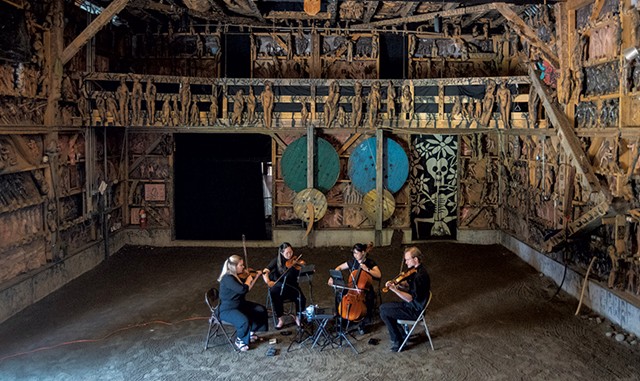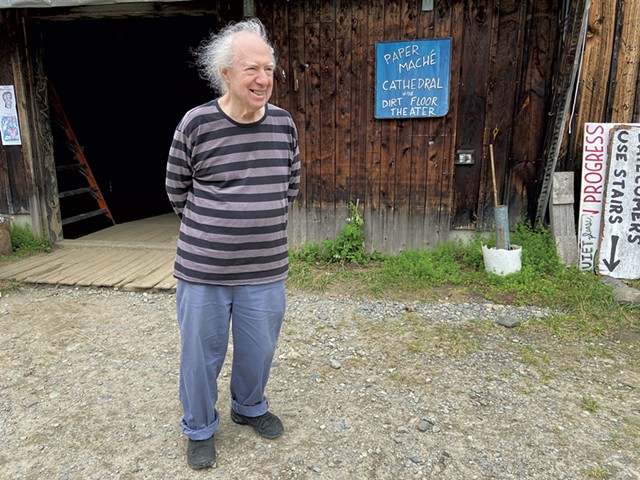
- Jeb Wallace-Brodeur
- The Kompass Quartet performing Grosse Fuge at Bread and Puppet Theater's Paper Mâché Cathedral
Artists Peter Schumann and Charlie Morrow have built reputations from works set in wide-open spaces. Schumann, the founding impresario of Bread and Puppet Theater, has for decades staged live theater spectacles in the fields and forests of the troupe's Glover farm. Sound and intermedia artist/entrepreneur Morrow, who divides his time between Barton and Helsinki, Finland, has created pieces that spanned entire cities and plumbed ocean depths; his 1982 "Toot N Blink" put two fleets of ships in dialogue on Lake Michigan.
Fans of these longtime collaborators might be surprised to learn that Morrow's new work, dedicated to Schumann, explores a confined interior: the psyche of Ludwig van Beethoven. Its performers are not mirthful melodramatists clad in white for a Bread and Puppet show but, rather, classical musicians in the black uniform of the highbrow concert scene. The piece is Morrow's "recomposition" of Beethoven's Grosse Fuge — aka Grand Fugue — with "seven stretches," or what Schumann called "elongations," of select musical passages.
The Kompass Quartet, composed of young string players who met at New York University, has been performing Morrow's interpretation of Beethoven's famously challenging Grosse Fuge in Bread and Puppet's rustic, dirt-floored Paper Mâché Cathedral every Saturday afternoon since July 15. It will play three more shows through August 26, each followed by the Bread and Puppet pieces "Idiots of the World Unite Against the Idiot System" and "Mother Dirt Church Services."
In characteristic Bread and Puppet fashion, the shows pull back the lens to wider-world issues as the cast bears signs, dons masks, carries puppets, dances and makes music in playful but pointed political commentary.
Classical music may sound at odds with the critical thrust and cheap-art aesthetic of Bread and Puppet. In fact, Grosse Fuge aligns well with the theater's experimental, expressionistic spirit. While puppets and pageantry are absent, the music compels attention to its arresting themes, plaintive moods and extended passages — Morrow's "stretches." The resulting sonic experience is more journey through mental states than mere song.
That Grosse Fuge was one of Beethoven's last string quartets is significant to Morrow, as it conveys the German composer's "sense of the next world ... a vision of heaven," he said.
As with much of Morrow's art, this piece emerges from a global consciousness. He cites Japanese butoh dance — with its slow, focused movements and evocation of life and death — as a strong influence. It's the appropriate mode for capturing Beethoven near the end of his life, completely deaf, "as though his mind had wandered," Morrow said.
In developing the work, "I was traveling with him," the artist added. Morrow treated every stretch "like a little story," he said, each striking a different tone — from a gentle rhythm to a scream to cellist Victoria Lin's clocklike pizzicato plucking.
Bringing in Lin and her Kompass peers — Jessica Gehring (violin), Matthew Ryan (viola) and Jade Schoolcraft (violin) — was "the answer to everyone's prayers," Morrow said. In January he asked the Craftsbury Chamber Players to take on his Grosse Fuge and variations, but they were already in rehearsals for their current season. So Fran Rowell, the group's music director, networked to find Kompass. She didn't require the quartet to audition — only to trust that this late endeavor would all work out.
"We jumped on it and said, 'This is going to form up,'" Rowell recounted. "We've made it happen, not in an orderly fashion that was set six months in advance, but it's exactly what we said we were going to do, and we're doing it."
Bringing ambitious classical musicians to Vermont for summer residencies has been part of the Chamber Players' long history, which dates back to the 1960s. Rowell's stepmother, Mary Anthony Cox Rowell, a former Juilliard School faculty member who died in 2019, cofounded the Chamber Players and started the tradition. Kompass has now become part of it.

- Erik Esckilsen
- Charlie Morrow
In addition to performing Morrow's work at Bread and Puppet, Kompass has joined the Chamber Players' concert program. Rowell described the Kompass musicians as "young adults with goals. We are not setting their goals for them." In addition to a car and a place to live for the season — and then another car when the first one's exhaust pipe fell off — her group has offered "guidance and experience," she said. "Nothing replaces that."
Violinist Gehring gave herself a "pat on the back" for holding her own with the Chamber Players. "We're making music with people who are successful in what we want to do," she said. "We're keeping up with the seasoned professionals ... Hey, we can do this."
Viola player Ryan also appreciated the challenge of performing compositions unfamiliar to him, such as a Felix Mendelssohn octet, without much preparation. He credited NYU with training him to learn "lots of music really fast and get it to a performance-ready state," he said.
Morrow knew Grosse Fuge would require musicians with "the agility and the muscular strength to move in slow motion," he said. Schoolcraft noted another challenge in the stretches. Whereas another composition might offer a rest here and there, Morrow's piece pushes "straight through," she said, calling for uncommon concentration on its peculiar timing.
"I feel like that, in some ways, is harder than the physicality," she said. "If I lose concentration for two seconds in the stretch, I don't know where I am."
Morrow praised Kompass for being up to the challenge. He was quick to note, however, that Beethoven had already set the bar exceptionally high. In Beethoven's time, "This was one of the gnarliest pieces written for a string quartet," he said. "They thought he was nuts." It's a work marked by "crazy rhythms," Rowell added, and "melodies trailing each other ... stacked up."
Morrow's work challenges the musicians to execute Beethoven's plan as well as Morrow's imagined sense of the composer's many moods. For cellist Lin, this makes the transitions tricky. "Immediately you have to change your headspace," she said.
In the Paper Mâché Cathedral, its weathered walls inset with ranks of human figurines — like denizens of a dreamscape — the music opens into an engrossing inner world. It is, by turns, a lively world full of what Gehring calls "fighting rhythms" and also languorous — with the stillness, for Morrow, of breathing.
For a beaming Schumann in attendance, whose affinity for Beethoven and chamber music goes back to his youth in Germany, the experience is "enormous." It's neither a circus nor puppet theater, but his old friend Morrow has created something that, in its own curious way, is at home at Bread and Puppet.
"It's overwhelming, what Charlie did," Schumann said.









Comments
Comments are closed.
From 2014-2020, Seven Days allowed readers to comment on all stories posted on our website. While we've appreciated the suggestions and insights, right now Seven Days is prioritizing our core mission — producing high-quality, responsible local journalism — over moderating online debates between readers.
To criticize, correct or praise our reporting, please send us a letter to the editor or send us a tip. We’ll check it out and report the results.
Online comments may return when we have better tech tools for managing them. Thanks for reading.